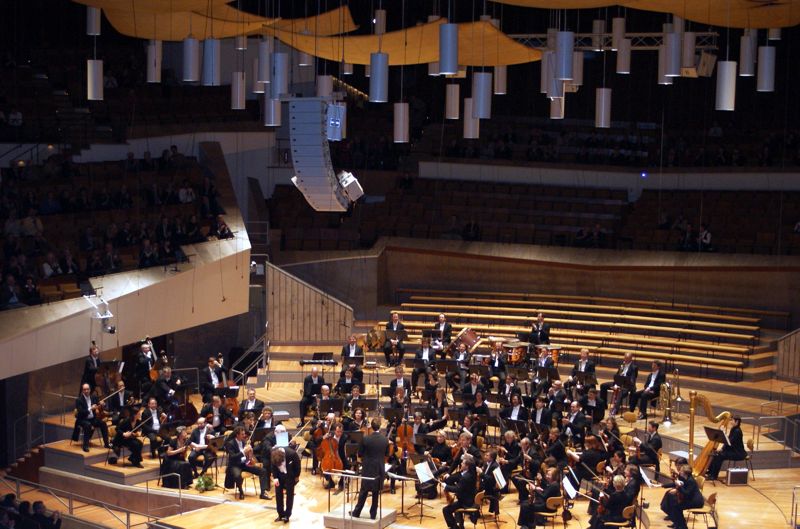|
|
|
| |
| |
| |
| |
| Jonas Kaufmann and German Critics |
22 January 2009
(Olle from Sweden was in Berlin on January 19 and sent me his
thoughts about the reviews for the concert. " I have been as baffled and
angered as yourself and your readers reading the German critics or rather
noting their non-observance of the Berlin concert. I didn't know whether
to laugh or be angry. Your readers have reacted and expressed their
reactions well. I had mine and formulated some thoughts .....")
|
Franz Schubert, Robert Schumann and Felix Mendelssohn
would shed bitter tears if they were able to read the musico-vocal
criticism of their fellow countrymen today, such as exemplified in these
pages. Friedrich Schiller, Johann Wolfgang von Goethe and Heinrich Heine
would join them. I don’t doubt it for a moment.
The reference to these names is not fortuitous. The object of criticism –
tenor Jonas Kaufmann – is the reincarnation of a man from the 1820’s or
-30’s. And I don’t refer to “romantic” looks or “romantic” curls, but to a
“way of being” far removed from today’s and one infinitely more
cultivated. The word “culture” defines Jonas Kaufmann better than anything
else. He happens to be exceptionally intelligent, as demonstrated in
conversations and interviews. He is as versed in languages as only very
musical persons tend to be. And he is consequently exceptionally musical.
In most performances maybe more so than any of his conductors.
 This
singer is met by too many Germans today with little understanding. He is
often judged with ignorance. Or from instinct, which is even worse. Even
object of what seems to be personal hate. As a foreign observer I cannot
help feeling that “shame” may play a role. The reaction so common in
“professionals” who failed to notice the genius living next door and had
to be told what was exceptional by foreigners. Unfortunately the feeling
of shame often takes the most unfortunate expressions. This
singer is met by too many Germans today with little understanding. He is
often judged with ignorance. Or from instinct, which is even worse. Even
object of what seems to be personal hate. As a foreign observer I cannot
help feeling that “shame” may play a role. The reaction so common in
“professionals” who failed to notice the genius living next door and had
to be told what was exceptional by foreigners. Unfortunately the feeling
of shame often takes the most unfortunate expressions.
Persons who are both intelligent and musical and who have a cultivated
singing voice can never sing badly. Jonas Kaufmann happens to be both and
also to have a voice of uncommonly attractive timbre (admittedly a matter
of taste). Vocal professionals more knowledgeable than myself always make
a distinction between “good voices” and “good singers” and never fail to
make clear that they absolutely prefer the latter. As a consequence there
are many professional singing artists with beautiful voices who are
uninteresting or even bad singers. To me Jonas Kaufmann is a tenor with an
uncommonly good voice, but he is an exceptional singer.
Many critics react negatively to the baritonal quality of the timbre,
which is hard to explain. There were always such voices. Many of the
foremost Wagnerian tenors started as baritones. The best of them, Lauritz
Melchior, said that good Wagnerian tenor voices had to be developed from
below. At the time of Rossini “il baritenore” was a separate voice
category. Had Jonas Kaufmann lived then and there - and he would have fit
in exceptionally well - he would no doubt have been defined as a
baritenore.
Still, what characterizes Jonas Kaufmann’s singing more than anything else
is his respect for a great vocal tradition. He is humble enough to accept
to learn from his predecessors. Also from those whom he never experienced
personally, but whose singing has been preserved by the gramophone or
described by their contemporaries. At times I’m reminded of the singing of
one of the eternal myths - Mattia Battistini - a baritone with an almost
tenoral extension. For their common love of dynamic variety, incredible
breath control and refined colouring of words and phrases. Interestingly
enough it’s in the most traditional repertory that I’m reminded of Jonas’
unique talent. There are in Verdi’s Requiem or in the tenor solo of
Beethoven’s 9th moments of almost belcanto refinement that I never heard
before (the purely vocal perfection of our own Jussi - I’m a Swede -
remains unique, of course).
I have come to understand that the purely aesthetic and intentionally
anti-naturalistic qualities of Jonas’ singing is what vexes his detractors
most. They believe in a continued positive development also in the art of
singing.
A way of singing of the 19th century repertory that they can identify as
contemporary and recognize. Our convictions will never meet.
But what grieves me most, perhaps, is that German critics don’t seem to
have noted that they have in Jonas Kaufmann one of the best interpreters
in recorded memory of their own very special vocal patrimony – the German
Lied. His way of interpreting the texts and the music of the geniuses
named in the first paragraph doesn’t fear comparison from a great 20th
century tradition. That´s also one of the reasons why their celestial
tears are today so bitter.
Article and photo
©
Olle |
| |
| |
| |
| |
| |
|
|
|
|
|